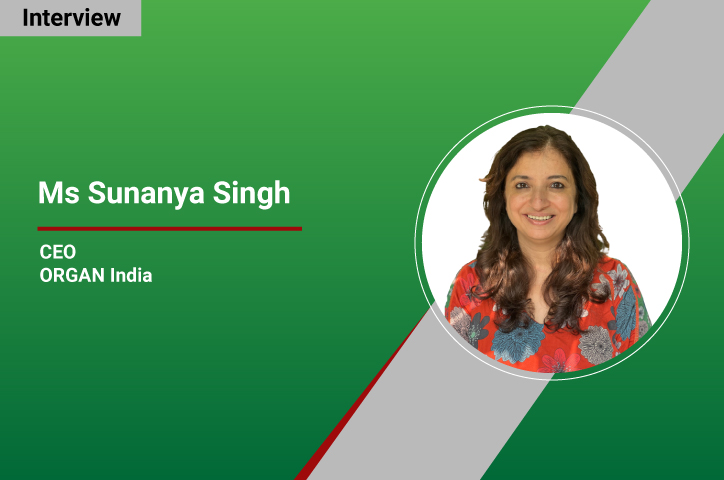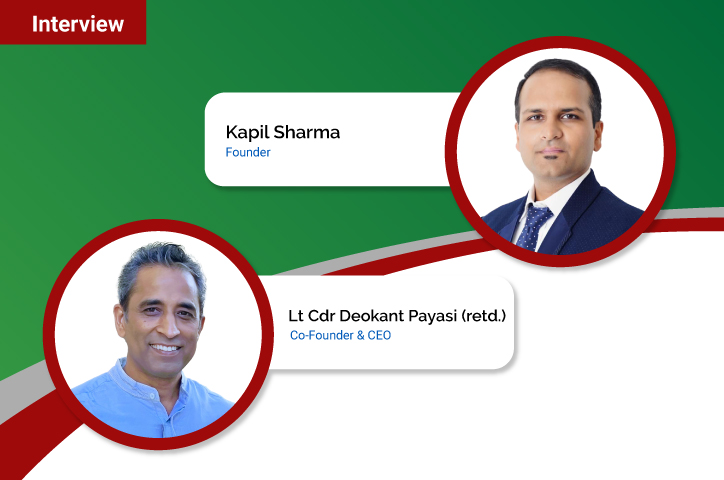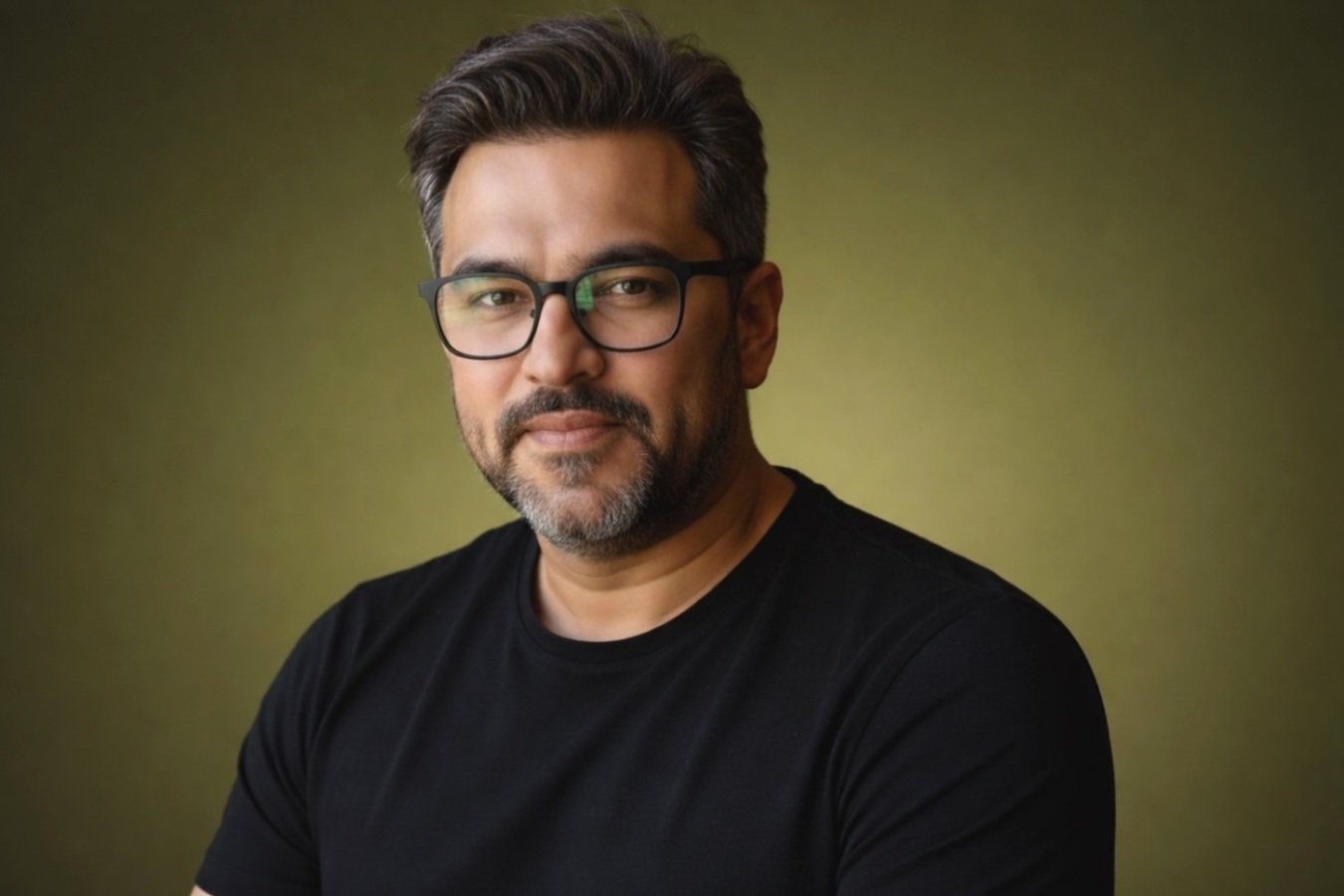Organ transplantation is a life-saving practice that has the potential to transform the lives of individuals facing organ failure. However, the organ donation industry is confronted with significant challenges such as misconceptions, lack of awareness, and logistical hurdles. Despite these obstacles, organizations like ORGAN India have emerged as beacons of hope, working tirelessly to raise awareness and promote a culture of organ donation.
In an exclusive interview with TheCSRUniverse, Ms. Sunayana Singh, CEO of ORGAN India shares valuable insights into the organization's mission, vision, and transformative initiatives. She delves into the collaborative efforts with key stakeholders, including NOTTO, corporates, and NGOs, to maximize their outreach and spread the message of organ donation.
Additionally, she shares how ORGAN India harnesses the power of sports, notably their participation in the World Transplant Games, to inspire individuals to become organ donors. Ms. Singh passionately shares how the athletes' awe-inspiring journeys and achievements shatter misconceptions, showcasing the incredible potential and vitality that a transplanted life can hold. Through their participation in this global sporting event, the organization aims to ignite a nationwide movement towards organ donation.
Read the full interview below to explore more about ORGAN India's journey and the significant impact it is creating in the field of organ donation.
Q. Please tell us about the mission, vision and goal of Organ Receiving & Giving Awareness Network (ORGAN) India.
Organ Receiving & Giving Awareness Network (ORGAN) India is an initiative of the Parashar Foundation a non-profit organization based in Delhi.
ORGAN India’s aim is two-fold; to raise awareness on organ donation across India, and to help people facing organ failure to get the right help. We have built an eco-system where people can access the information easily we have carried out numerous initiatives for the purpose.
Awareness activity across India offline and online is one of our biggest strengths. We work closely with NOTTO (National Organ & Tissue Transplant Organization) and have collaboratively carried out many awareness events as well as the organized the Collaborative Conclave for Organ Donation under the aegis of NOTTO. The Conclave is an annual meet of all NGOs in the space of organ donation and transplant across the country to discuss challenges, new initiatives and collaboratively discuss the way forward.
Besides this, we have also tied up with leaders and celebrities to create awareness and encourage people to sign up as donors. Several short films have been commissioned by ORGAN India and screened on different platforms.
Our constant radio programming over the last two years on All India Radio and several community radio stations are the first of their kind in India on a consistent basis and are very well received.
Social media is the one place we have effectively harnessed over the years to reach out to millions across the country through innovative media campaigns. Campaigns with corporates partners such as MTV for MTVORGANDAAN and JK Masale in Eastern India have been huge success in various parts of India. We have hosted many on-ground drives across the country at colleges, clubs, corporate houses, and schools to make people aware of organ donation and encourage them to pledge. Our school program since 2015 is a highly successful program and we have covered close to 200 schools with engaging and interactive sessions.
We have MoUs with District in Haryana and Seminars organized with the medical community across the country – be it doctors, medical students, nurses etc.
Our latest project, which was a massive success, was as Team Managers for the Indian Contingent at the World Transplant Games 2023, at Perth Australia. We had the largest contingent of 32 players going and winning 35 medals. Getting together the team, training players, and taking them for a successful innings in Australia has greatly inspire the public here in India and highlighted the benefits of organ donation and transplant. We are really looking forward to it.
Q. What are the factors that led to its inception in 2013, and how has the organization evolved over the years?
The former Chairperson of the Parashar Foundation, Late Mrs. Kirit Parashar needed a heart transplant in 2013 and the difficulty faced by the family eventually led to the conceptualization of ORGAN India - a platform that would raise much need awareness on organ donation.
Q. How has ORGAN India helped in raising awareness about the need for organ donation in India, and what impact has this had on the number of organ donors in the country?
Under the leadership of its CEO, ORGAN India has emerged as one of the key bodies in India working on the issue of organ donation. The organization has made significant contributions to raising awareness and has a Pan-India presence, working closely with the National Organ & Tissue Transplant Organization (NOTTO).
The World Transplant Games and our extremely successful participation at the global event is one more initiative to help bring this cause to the centre stage.
We offer paramount patient support for patients and their families. There is a directory on our website, a first-of-its-kind where we have mapped out the entire process including what hospitals offer transplants, how to make appointments, where to stay around the hospitals, and who are the concerned teams.
Our chairperson Mrs. Kirti Parashar had a heart transplant and at the time the family went through a lot of obstacles. This pushed us to go far and beyond and map out this kind of information in all of India for different transplants so we can extend this help to other people going through this.
We have also set up a 24X7 helpline manned by our team to make sure that we are prompt in our responses. We get almost 250 calls a month and our team helps people with get all the help possible and coordinates many eye and body donations.
Q. How has the organization leveraged sports to promote organ donation awareness and inspire more people to become donors? What is your main motive behind participating in the World Transplant Games?
India has traditionally been known as a strong force in various sports with many remarkable athletes making their mark on the world map. The transplant athletes too have been putting India on the map for years! Many of our transplant athletes have won medals at the World Transplant Games since 2011. These athletes, once on the brink of disability and death due to illness, received the gift of organ transplant and today live healthy and active lives.
Over the past 18 months, we have sought out and trained 32 athletes from across India. From training at the Manav Rachna Sports Science Institute to helping them with sponsorship from several trusts and corporates, visa processing, and managing the entire trip, we have creating the best team ever to go to this global event.
The participation of transplant patients or donors in this International event is a demonstration of the fact that there is not only life after transplant, but it’s a very fit and healthy life. Transplanted persons can be fitter than those who are not transplanted and go on to will laurels for the country. The embody the limitlessness of the human spirit in overcoming adversity and continuing to live fulfilling lives whilst inspiring others across India for organ donation. That is the motivation behind the World Transplant Games.
Q. In your experience, what have you learned about effective approaches to promoting organ donation awareness through sports, and how can other social sectors stakeholders like corporates, NGOs and government agencies replicate this approach in their own initiatives?
Organ donation is finding more acceptance in India though we still have a long way to go.
The solution lies in educating the masses and sensitizing them about organ donation.
Accelerated by our lack of information, organ donation is often feared and associated with organ rackets and the negative connotation persists. Once the audience witnesses the healthy and active lifestyle that the athletes are living, it will bust many myths and inspire people to come forward and pledge to donate their organs after their death. It brings out the most positive side of organ donation. People can see that after organ donations, others live very normal and healthy lives. The athletes are symbols of what is so right and good about organ donation.
We have found this to be a very effective approach. Many of our transplant athletes won medals at the games and through them in their respective cities and districts, there is already such a wave of celebration. There is a positive impact where many people now see that transplants and organ donation patients go on to live healthy, happy, and active lives!
Athletes have gone to their various states across India and have been welcome sometimes with Band Baja! People are proud of their heroes and awareness goes up automatically in their cities. And this is the approach other organizations can take. Sports is something that unifies and inspires everyone, and creating awareness through sports is can be very effective.
Q. How does ORGAN India collaborate with other social sector stakeholders especially corporates to help expedite its efforts?
With ORGAN India we work on a collaboration conclave every year wherein we bring together every NGO that works for organ donation and the National Organ Transplant Tissue Organization (NOTTO) and talk about the challenges we face and chart a course for the coming years to promote this life-saving practice.
We collaborate with a lot of corporates for awareness activities within their organizations. Some do a session online for their India employees, others like Jet Airways, Reliance Healthcare have done a full month of activities and promotions to raise awareness withing their organizations. Some have gone as far as to make their own creatives, ad campaigns and sharing them on their platforms for more visibility.
Our biggest campaigns have been with MTV in a campaign called MTVORGANDAAN. MTV created fantastic, fun and informative movies, creatives and a whole campaign was launched to reach out to the youth. It was called MTVORGANDAAN – Get your OTP to Heaven! The whole ideas was that the moment you pledge to become an organ donor after your death, you will get your OTP to heaven. It was a wonderful campaign and people still come to the mtvorgandaan website to pledge.
Another noteworthy campaign took place in Eastern India with JK Masale, which turned out to be the largest campaign in the region. The campaign involved strategically placing hoardings throughout Kolkata and enlisting the support of the brand ambassador for their company. One of the most remarkable aspects of the campaign was the inclusion of a small note encouraging organ pledges in every masala packet, whether purchased online or offline. It is truly astonishing how such a simple initiative can generate significant awareness across the country.
Q. What are some of the biggest challenges that the organ transplant industry in India is facing especially in the context of myths and misconceptions surrounding it, and what measures can be taken to address them?
With a country as diverse and populated as India, the possibilities are huge but we continue to ignore this crisis. India is a nation of varied social, economic and cultural belief systems. We are a strong nation but when it comes to organ donation, we have done little to nothing to help further the cause. The lack of awareness, illiteracy and religious superstitions hamper this life-saving practice.
Organs are not retrieved from thousands of brain-dead patients, which could help many critically ill patients hanging by a thread and fighting for their lives. While it's tough to say exactly what the figures are, it is estimated that almost half a million people are suffering from organ failure, and less than 3% of them receive a life-saving organ.
While the numbers are rising for organ donation, we are still lagging. There needs to be more awareness and efficient logistics across the country and a much better network in the tier 2 and tier 3 cities to be able to increase the donor pool.
Q. How can individuals and communities contribute to saving lives through organ donation and promote a culture of giving?
When it comes to organ donation there are many misconceptions that still plague people’s decision. There is still some mistrust or not knowing if the organ will be used for the needy or if everything is above board etc. There need to be increased conversations around the topic. We already have a culture of giving and of daan. Let’s increase the scope of that to include our bodies and organs, and save so many lives.
















.jpg)


